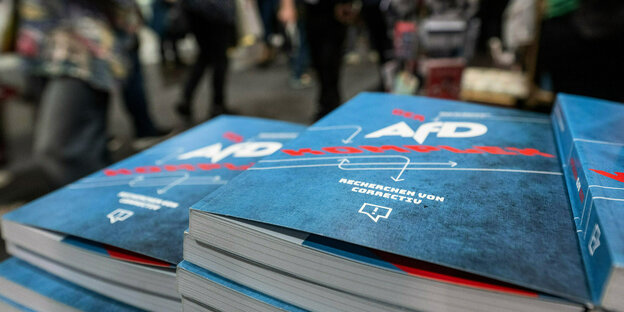The Higher Regional Court in Hamburg finally rejects the complaints of two participants in the “remigration” meeting. Correctiv can still report.

Correctiv research was in great demand at the Leipzig Book Fair Photo: Hendrik Schmidt/dpa
The investigation platform Correctiv has achieved an important legal victory. The Higher Regional Court in Hamburg rejected the complaints of two participants in the Potsdam meeting, in which right-wing actors discussed the “remigration” of people of immigrant origin. Information about the meeting in the article “Secret plan against Germany” sparked large demonstrations against the AfD throughout the country.
Lawyer Ulrich Vosgerau, who was at the meeting in Potsdam, and another participant appealed against a decision of the lower court of the Hamburg Regional Court. In February, he criticized Correctiv's report on one point, but left two others intact. The plaintiffs wanted the Higher Regional Court to ban these two passages as well. This makes them inferior. The complainants must cover the procedural costs of 20,000 euros each.
In the decisions available to the TAZ, the Higher Regional Court of Hamburg highlights the “exceptional public interest” of the information.
Ulrich Vosgerau had specifically disputed two claims: First, his response to a Correctiv question had been misrepresented. Correctiv asked Vosgerau how he felt “in retrospect about the central statements made (in Potsdam). Vosgerau responded that, as far as he could remember, no one had said that people who had German citizenship should be repatriated or denaturalized in any way.
He added to his response that legal implementation of this was “normally” not possible.
Correctiv published the lawyer's response summarized as follows: “But he does not want to recall the idea of expatriating citizens at Sellner's conference.” The court considers this summary admissible.
The omission of the second sentence on the legal application of remigration is also permissible, since, by nature, “information and news must be evaluated, abbreviated, summarized or even omitted.”
As long as it does not create a distorted image of reality or a “negatively distorted image” of the person, common journalistic practice corresponds to the journalistic duty of care. The legal doubts raised at the Potsdam meeting about the implementation of “remigration” are addressed elsewhere in the text.
Vosgerau also complains that his statements published by Correctiv about the supposed ability to influence young voters of Turkish migrant origin were summarized in an impermissible manner. The higher regional court sees this differently and follows the lower court.
It's all about the smaller details like the items.
The second plaintiff together with Vosgerau against the Correctiv publications objected, among other things, to the claim that he was a “large donor to the AfD”. However, the higher regional court dismissed his claim, citing the plaintiff's repeated donations of almost 50,000 euros to the AfD.
The court also did not consider the public mention of his name problematic, since the public interest in reporting in this case outweighed the right to privacy.
As is usual in media law litigation, there are a number of details at play, at one point including whether a definite or indefinite article was used correctly.
It has not yet been decided whether the two plaintiffs will consider taking additional legal action. Lawyer Carsten Brennecke from the Höcker law firm, who represents Vosgerau in court, underlines in a press release that Correctiv is still prohibited from disseminating a passage of the text. However, this point was not at all the subject of the proceedings before the Higher Regional Court.
After the first trial in February, many media outlets focused mainly on the fact that Correctiv had to correct one passage, although two other passages, and therefore the core of the report, were not objected to.
The passage that cannot be spread further: Vosgerau had considered in Potsdam “a model letter” to question the legality of the elections.
According to the Higher Regional Court in Hamburg, the central point of the investigation can now continue to be made public: that at the Potsdam meeting right-wingers raised money and talked about the expulsion of leftists and people of immigrant origin. Correctiv can continue to spread this.